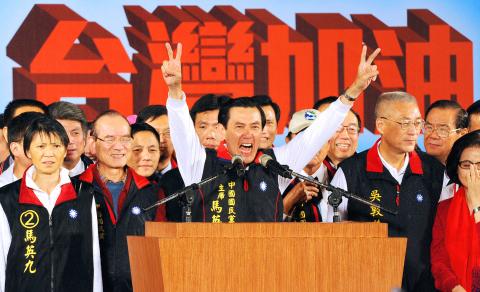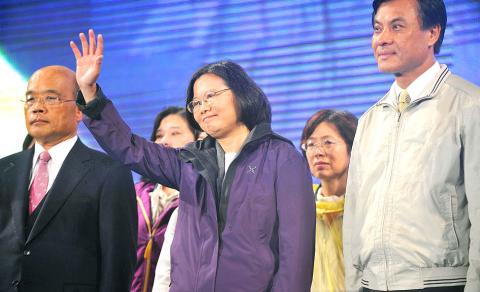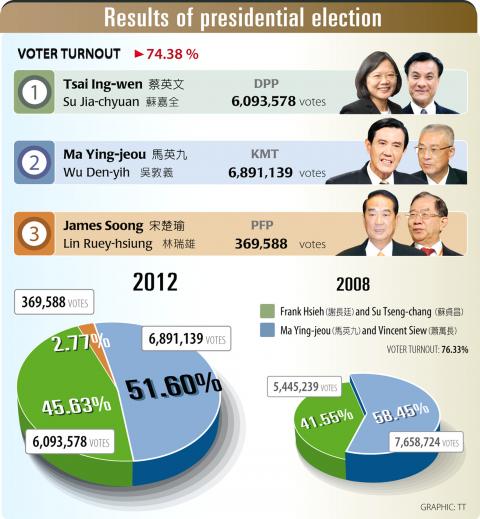President Ma Ying-jeou (馬英九) yesterday secured a second four-year term in office, ending the Democratic Progressive Party’s (DPP) hope for a return to power.
Ma won re-election with more than 6.8 million votes, leading his DPP challenger, Tsai Ing-wen (蔡英文) — who garnered more than 6 million votes — by about 800,000 votes.
According to the figures released by the Central Election Commission (CEC) after the vote counting process was completed shortly before 10pm, Ma received 6,891,139 votes, or 51.6 percent of the total votes; Tsai won 6,093,578 votes, or 45.63 percent of the total; while the People First Party’s James Soong (宋楚瑜) took 369,588 votes, or 2.77 percent of the total votes cast.

Photo: Toshifumi Kitamura, AFP
The voter turnout was 74.38 percent, with 13,452,016 of the 18,086,455 qualified voters casting their votes, CEC figures showed.
Central Election Commission Chairwoman Chang Po-ya (張博雅) announced the numbers immediately after the vote-counting process was completed at a press conference at the Vote Counting and Information Center in Taipei.
“The figures will be finalized at a CEC meeting on Jan. 19,” Chang said. “After the commission confirms the numbers, we will publish the official results.”

Photo: Patrick Lin, AFP
Although Ma won, the total number of votes he received dropped by more than 767,000, from 7,658,724 in 2008, when he received 58.45 percent of the total vote.
On the other hand, votes for the DPP’s presidential candidate increased by 648,000 from 5,445,239 votes in 2008, a growth of 4.05 percent.
Speaking before thousands of jubilant supporters at his national campaign headquarters in Taipei, Ma said his cross-strait policies had resonated with voters.

GRAPHIC: TT
“They gave us support for our policy to put aside differences with the mainland [China], to search for peace and turn it into business opportunities,” he said.
“This is not Ma Ying-jeou’s personal victory, but one for the Taiwanese people. It’s also a victory for our direction toward a clean government, prosperity and peace,” he said.
“I want to thank everyone for your support that has given me the opportunity to achieve the changes Taiwan needs in another four years [in office]. I will never let you down,” he added.
Ma’s re-election is set to be seen in Beijing as a big victory for Chinese President Hu Jintao (胡錦濤), who has moved away from China’s previous policy of repeatedly threatening Taiwan with war and instead has tried to woo Taiwanese by showing the economic benefits of closer ties.
There was no immediate reaction from Beijing on the election results.
Tsai conceded defeat at a press conference in New Taipei City (新北市) soon after Ma spoke to his supporters.
Tsai congratulated Ma on his victory and offered to resign immediately as DPP chairperson, saying that she took full responsibility for the loss.
“It was never easy to challenge an incumbent president. We didn’t do well enough in central and northern Taiwan. I am sorry that I have let our supporters down,” Tsai said.
“I know everyone is sad about the result. It’s OK to cry,” she added. “It is OK to feel depressed and disappointed, but don’t be frustrated and don’t give up. We still need to fight for Taiwan with optimism.”
Tsai urged Ma to listen to the people’s voice in his second term and despite his victory, she still thinks that a domestic consensus is essential before engaging in any further negotiations with Beijing.
She expressed her gratitude to her supporters, saying that their determination for reform should be carried on and that the DPP would be back in the future.
This was the second time Soong has run for president, following his initial bid in 2000, when he received 4,664,932 votes — 36.8 percent of the total votes at the time — and was the candidate with the second- highest number of votes.

NATIONAL SECURITY THREAT: An official said that Guan Guan’s comments had gone beyond the threshold of free speech, as she advocated for the destruction of the ROC China-born media influencer Guan Guan’s (關關) residency permit has been revoked for repeatedly posting pro-China content that threatens national security, the National Immigration Agency said yesterday. Guan Guan has said many controversial things in her videos posted to Douyin (抖音), including “the red flag will soon be painted all over Taiwan” and “Taiwan is an inseparable part of China,” while expressing hope for expedited “reunification.” The agency received multiple reports alleging that Guan Guan had advocated for armed reunification last year. After investigating, the agency last month issued a notice requiring her to appear and account for her actions. Guan Guan appeared as required,

A Vietnamese migrant worker yesterday won NT$12 million (US$379,627) on a Lunar New Year scratch card in Kaohsiung as part of Taiwan Lottery Co’s (台灣彩券) “NT$12 Million Grand Fortune” (1200萬大吉利) game. The man was the first top-prize winner of the new game launched on Jan. 6 to mark the Lunar New Year. Three Vietnamese migrant workers visited a Taiwan Lottery shop on Xinyue Street in Kaohsiung’s Gangshan District (崗山), a store representative said. The player bought multiple tickets and, after winning nothing, held the final lottery ticket in one hand and rubbed the store’s statue of the Maitreya Buddha’s belly with the other,

DAREDEVIL: Honnold said it had always been a dream of his to climb Taipei 101, while a Netflix producer said the skyscraper was ‘a real icon of this country’ US climber Alex Honnold yesterday took on Taiwan’s tallest building, becoming the first person to scale Taipei 101 without a rope, harness or safety net. Hundreds of spectators gathered at the base of the 101-story skyscraper to watch Honnold, 40, embark on his daredevil feat, which was also broadcast live on Netflix. Dressed in a red T-shirt and yellow custom-made climbing shoes, Honnold swiftly moved up the southeast face of the glass and steel building. At one point, he stepped onto a platform midway up to wave down at fans and onlookers who were taking photos. People watching from inside

‘NATO-PLUS’: ‘Our strategic partners in the Indo-Pacific are facing increasing aggression by the Chinese Communist Party,’ US Representative Rob Wittman said The US House of Representatives on Monday released its version of the Consolidated Appropriations Act, which includes US$1.15 billion to support security cooperation with Taiwan. The omnibus act, covering US$1.2 trillion of spending, allocates US$1 billion for the Taiwan Security Cooperation Initiative, as well as US$150 million for the replacement of defense articles and reimbursement of defense services provided to Taiwan. The fund allocations were based on the US National Defense Authorization Act for fiscal 2026 that was passed by the US Congress last month and authorized up to US$1 billion to the US Defense Security Cooperation Agency in support of the